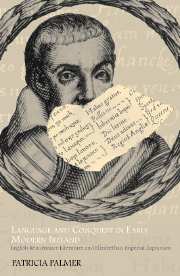 Language and Conquest in Early Modern Ireland
Language and Conquest in Early Modern Ireland Book contents
- Frontmatter
- Contents
- Acknowledgements
- List of abbreviations
- Introduction
- Chapter 1 Conquest, colonial ideologies and the consequences for language
- Chapter 2 ‘A bad dream with no sound’: the representation of Irish in the texts of the Elizabethan conquest
- Chapter 3 ‘Wilde Speech’: Elizabethan evaluations of Irish
- Chapter 4 ‘Translating this kingdom of the new’: English linguistic nationalism and Anglicisation policy in Ireland
- Chapter 5 New world, new incomprehension: patterns of change and continuity in the English encounter with native languages from Munster to Manoa
- Chapter 6 The clamorous silence
- Conclusion
- Glossary
- Notes
- Bibliography
- Index
Chapter 3 - ‘Wilde Speech’: Elizabethan evaluations of Irish
Published online by Cambridge University Press: 22 September 2009
- Frontmatter
- Contents
- Acknowledgements
- List of abbreviations
- Introduction
- Chapter 1 Conquest, colonial ideologies and the consequences for language
- Chapter 2 ‘A bad dream with no sound’: the representation of Irish in the texts of the Elizabethan conquest
- Chapter 3 ‘Wilde Speech’: Elizabethan evaluations of Irish
- Chapter 4 ‘Translating this kingdom of the new’: English linguistic nationalism and Anglicisation policy in Ireland
- Chapter 5 New world, new incomprehension: patterns of change and continuity in the English encounter with native languages from Munster to Manoa
- Chapter 6 The clamorous silence
- Conclusion
- Glossary
- Notes
- Bibliography
- Index
Summary
Sic ut e thymo mel apis, aranea venenum exugit, sic a linguis bonum aut malum pro suo quisque arbitrio elicit.
John Lynch, Cambrensis Eversus, p. 180The Elizabethans' reluctance to train their attention on the Irish language is part of their wider refusal to see Gaelic society in its integrity. Their texts give no sense of native culture in its fullness and internal coherence. Gaelic Ireland enters only as bursts of irrational disorder: fragmentary, inexplicable and perverse. Never seen on its own terms, the native world figures only as a series of irritants, anomalies and departures from an English norm: ‘Wee liue in Clenly houses, they in Cabinns or smoaky Cottages. Our cheefe husbandry is in Tillage, they dispise the Plough’ (Moryson, Shakespeare's Europe, p. 214). A discourse of difference opens up: native conduct and customs, refracted through incomprehension and hostility, emerge as deviations. The role of Irish within that discourse, however, is far from simple. The previous two chapters have demonstrated that whereas the Spanish highlighted language within their discourse of difference, English writers consistently erased language difference textually. A peculiar combination of ritually thematising selected cultural differences while repressing the linguistic one is well illustrated in English writers' handling of one of their most assured contrasts, that between English husbandry and Irish nomadism. But just as that easy antithesis repeatedly comes under strain so, too, does the occluded language difference make its presence felt.
- Type
- Chapter
- Information
- Language and Conquest in Early Modern IrelandEnglish Renaissance Literature and Elizabethan Imperial Expansion, pp. 74 - 107Publisher: Cambridge University PressPrint publication year: 2001


